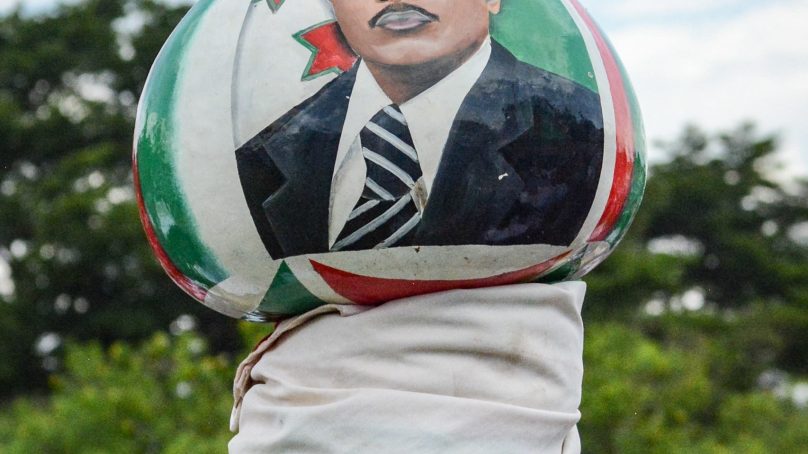
While regimes hoisted on cult of personality may appear durable – frequently deploying “anti-imperialist” and “anti-colonialist” rhetoric to appeal to African sympathies while also positioning themselves as key Western partners on counterterrorism and regional stability – they are inherently fragile.
Security services in such contexts are often used to suppress opponents. Moreover, their obedience is tied to the leader and bound up in the cult of personality, rather than the constitution. Personal loyalty is prized above professionalism. This creates divisions with some being seen as “more reliable” than others.
The involvement of the military in dynastic successions in the Democratic Republic of the Congo (2002), Togo (2005), Gabon (2009) and Chad (2021) further illustrates the effect that personality cults can have on the security sector. The military, moreover, is reportedly being used to smooth the ascension to high office of a new crop of presidential sons in Cameroon, the Republic of the Congo and Gabon.
In Zimbabwe, Robert Mugabe tried to install his wife, Grace, but the military refused and ultimately unseated him and installed his former student, Emmerson Mnangagwa. It now rules behind the scenes.
The claims of family succession have reached fever pitch in Uganda, where senior military leaders have been involved in a high-profile campaign dubbed “MK 2026” that many say is testing public reaction to a scenario in which President Yoweri Museveni – Africa’s fourth longest ruling leader – hands power over to his son, General Muhoozi Kainerugaba, commander of the Land Forces and founder of the elite Special Forces Command.
This campaign included nationwide celebrations to mark Kainerugaba’s 48th birthday in 2022, with the Uganda Peoples Defence Forces (UPDF) playing a prominent role.
Kainerugaba’s meteoric rise in the UPDF has sparked intense speculation over the years as Museveni’s power base is widely perceived to have shrunk. The UPDF, formerly the National Resistance Army – the armed wing of the ruling National Resistance Movement (NRM) – is steeped in Museveni’s personal story, which takes on legendary status in NRM and UPDF confraternities.
Museveni’s followers and staff call him “Mzee” (“respected elder”), a title of endearment and reverence. Museveni for his part refers to Ugandans – particularly the youth – as bazukulu or grandchildren, in all his addresses and official communications. Many young people in turn call him Jajja or Grandpa.
These seemingly normal expressions of affection belie a cult of personality that has taken root, particularly in the military – Museveni’s primary constituency. The UPDF’s official history – taught in all military schools – consists of books and pamphlets Museveni authored during the NRA armed struggle.
The annual “Tarehe Sita” (The Sixth Date) week-long national commemorations mark the day Museveni seized power (February 6, 1986). His teachings are also propagated through “Patriotism Clubs” established in all 136 districts and select schools by the National Secretariat for Patriotism Corps – a joint venture of the UPDF’s Chief Political Commissariat (CPC) and the President’s Office.
The CPC oversees patriotism education modelled on Museveni ideological tenets (some call it “Musevenism”) in all military units. The UPDF and NRM also organize regular camps where citizens retrace Museveni’s journey leading troops through the jungles where his rebellion was based.
The UPDF’s involvement in suppressing opponents, election-related violence, and intimidation is unsurprising, given its deep entrenchment in Museveni’s cult of personality. The UPDF supported the removal of term limits in 2005 and age limits in 2017, further cementing the monopolisation of power.
Senior UPDF members frequently threaten “dire consequences” on Museveni’s political challengers, and many openly campaign for him during elections.
“I cannot hide my love for NRM and Museveni,” explained Brigadier General Elly Kayanja, who dismissed “a mere law” that ostensibly prevents service members from engaging in partisan politics. Still others have publicly vowed that they [UPDF] will neither salute nor serve anyone else.
At the same time, some in the army are reportedly deeply troubled over Kainerugaba’s status—pitting what is left of the so-called “old guard” of military professionals against younger cohorts in their late thirties to mid-forties who are said to be more politicized.
Guinea Bissau’s Umaro Sissoco Embaló, who came to power with the military’s support in 2019, calls his governing style “Embalóism,” which he describes as order, discipline and development. He compares himself to former Philippines strongman, Rodrigo Duterte. Burundi’s ruling National Council for the Defense of Democracy – Forces for the Defence of Democracy (CNDD-FDD), similarly, took a page from North Korea’s ruling party by changing its laws to declare Pierre Nkurunziza the “Supreme Guide for Patriotism.” Had he lived, he would by law have wielded veto power over the president and prime minister.
Cults of personality are enabled by the assumed association between autocracy and stability. Instead, prolonged rule is linked to higher levels of instability, as well as stunted democratic and institutional development.
Institutionalising democratic checks and balances on power, especially the strengthening of term limits, are guardrails against perpetual presidential tenures – and the cults of personality that go along with them.
- A Tell / African Institute Strategic Studies report











